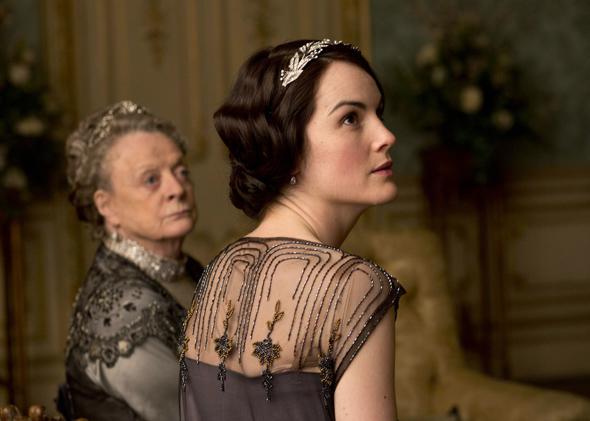Friends,
There are only two shows that I have ever officially “recapped,” which is to say written about each week come rain or shine or snow or Abu Nazir: Homeland and Downton Abbey. Do you see the problem there? Both Homeland and Downton Abbey are, to my mind, shining, glittering examples of complete and total quality collapse. Both are series that I once loved and adored on a kind of incommunicable level; I had to force myself to rave about them using complete sentences because my initial thoughts were pure animal cognition: “Ahhh. So. Good. Must. Watch. Now.”
Both shows had excellent first seasons, anchored by powerful, prickly performances from their leading ladies (put Lady Mary and Carrie Mathison in a room and Carrie Mathison is the one who leaves crying) and scene-stealing turns from cagey and experienced actors (Dowager Countess, I introduce to you Saul Berenson). Both shows had flawed second seasons punctuated by a few wonderful moments that kept me believing they could turn things back around. This year, both shows aired third seasons that pushed my nose into the new grim reality of their awfulness, and hard.
If only both of these shows had been just one season long! I understand that commercial imperatives make shows go on and on, but that doesn’t mean I can’t decry the structures of capitalism while typing on a computer made in questionable working conditions and getting ready to pledge to a Kickstarter to bring back Happy Endings. So many times this year I wished for TV shows to be more rigorous, less like floppy, extra-long noodles. (A month or so ago I fell in love with movies anew: Guys, they are only two hours and then they are done.)
It’s not just Homeland and Downton. Broadchurch and The Fall are two lithely constructed crime dramas that, for some reason, are going to have second seasons. (And Broadchurch, God help us, an American remake.) Watching Sleepy Hollow, Fox’s wacky procedural about Ichabod Crane, I got preannoyed thinking about how dull the sparky chemistry between the show’s leads will be in three seasons, when they are stuck in rote will-they-won’t-they positions, hacking out cases with no momentum. Meanwhile, the most perfectly crafted show of the year was, I thought, Top of the Lake, which is seven episodes long and will never be one more. American Horror Story reinvented itself, audaciously, for the third time. And Breaking Bad achieved the sort of narrative propulsion it did because Vince Gilligan knew where he was going and didn’t take extra time getting there.
I even felt a little bit like Mad Men this season was biding its time. Jim, you said you never know where an episode of Mad Men will go. But don’t we know how it will feel and look with its moody and elliptical lines and metaphors, the punctuating joke, the drinking and the smoking and the smoldering, and this season anyway, Don’s psychological rut? I am not trying to downplay Mad Men’s excellence, but I think that there is a tendency to overstate any TV show’s originality, especially one going into its seventh season. Part of the pleasure of TV is, at some point, you know what you are getting into, know that you are slinking into a bath of a certain temperature with some familiar bath toys arrayed about you. The critical establishment may scoff at the movies’ current thrall to sequels and reboots, but in a way, every single episode of a TV show is a sequel.
Obviously, there is a flip side to my wish that every show immediately cut itself down to one season and no movie: When Bunheads got canceled I was distraught, as I know some of you were about the cancellation of Enlightened. And I was as excited as anyone by the return of Arrested Development. But the new episodes of Arrested Development—good, not great, I thought—proved what I already felt from my past experiences with My So-Called Life and Freaks & Geeks and all the other prematurely canceled shows we have loved and lost: If there was enough of a show that it is beloved, that means there was enough of the show. In the heat of the moment I wanted more Bunheads and Happy Endings. And I think it stinks that genuinely funny and great things can’t survive when crappier things do. (I’ll be pouring some out for Trophy Wife if it doesn’t get renewed.) But TV shows have long afterlives now. Eighteen episodes may be less than we wanted, but it’s not less than we need.
I want to take a turn here to discuss what I’ll remember most about Enlightened: the performances. Amy Jellicoe may not have had a huge audience, but as an archetype, her future is as bright as Tracy Flick’s—and that’s all because of Laura Dern. Trophy Wife has a really deep cast with three women, Malin Akerman, Michaela Watkins, and Marcia Gay Harden, each holding down in a different register and all constantly in danger of—as W.C. Fields warned—being overshadowed by a kid. (I can not get enough of Albert Tsai’s Bert.) Mom is an uneven sitcom, but Allison Janney is not an uneven actress. (Between her and Akerman, it’s been a good year for women who have the gait of graceful baby colts.) Watching New Girl try to develop the character of Winston (Lamorne Morris) by making him broader, crazier, and weirder has been one of the most riveting sideshows in TV, a grand display of let’s-figure-it-out-on-the-air only outdone by The Mindy Project’s ongoing efforts to corral its ever-expanding stable of high-energy bros. And then there’s Gordon Ramsay, who revealed unexpected range by playing a nice guy and great teacher on the wonderful reality show Junior Masterchef. And I haven’t even talked about Sleepy Hollow’s Nicole Beharie yet!
What performances did you love? What performances fascinated you?
Willa
